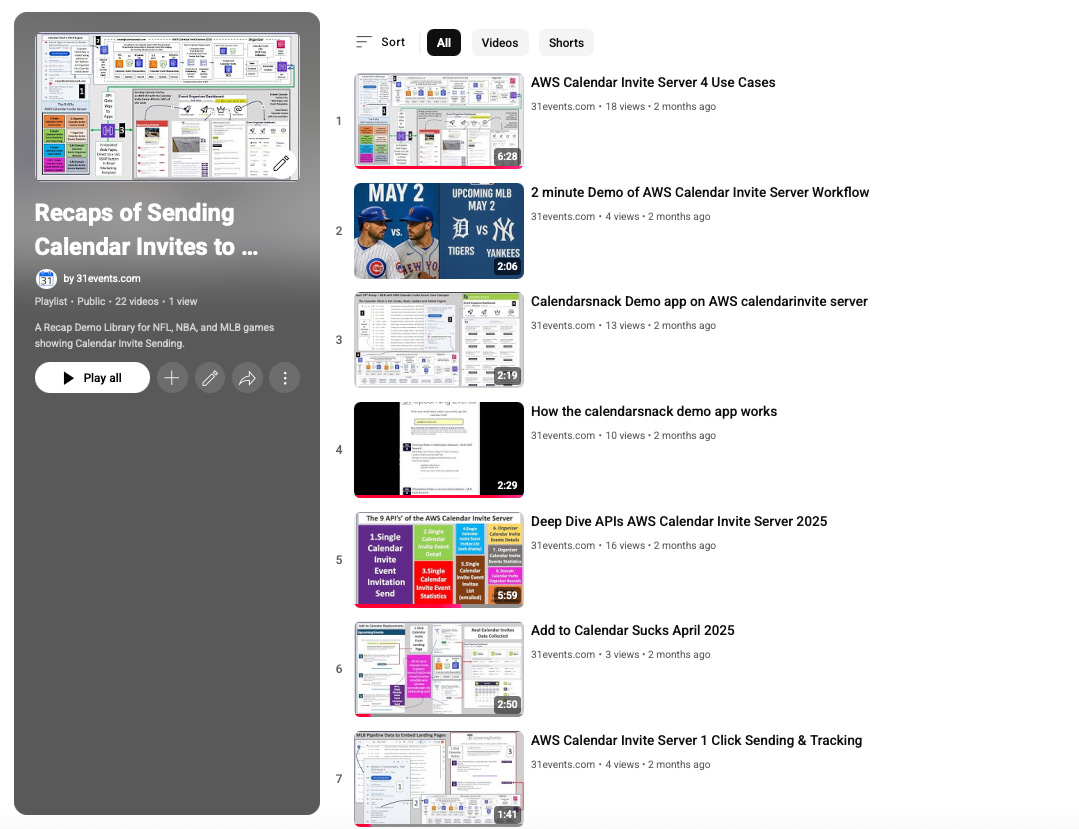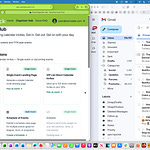The AWS Calendar Invite Server Demo showcases its sophisticated functionality in generating, sending, and tracking calendar invitations at scale.
The AWS Calendar Invite Server Demo series show cases the emerging use cases of how it could be used in 100’s of use cases.
Here's a detailed discussion of calendar invites based on the sources:
Core Mechanism of Sending:
The system utilizes custom APIs that call the AWS Simple Email Service (SES) to send calendar invitations. This enables "one-click sending" of invitations.◦
The technology is "pre-loaded with AWS" and communicates with an "API Gateway" to facilitate the sending process.
Methods of Sending Calendar Invites:
From the Calendar Snack Interface: Users can send invitations directly from the Calendar Snack Interface with a single click.
From Autogenerated Landing Pages: The system can autogenerate landing pages that display upcoming events (like MLB or NFL games).
Users can then select events on these pages and request to "get the calendar invite," which is then sent to their specified email address. These landing pages can be decorated with details like date, organizer, time, start, and event location.
Batch Sending (VIP Lists): The service supports sending calendar invites to a list of recipients, such as a "VIP list," by uploading a file (e.g., a text file) containing email addresses. This allows for "batch runs" of invitations for multiple emails for a specific event.
Embedding Options: The technology allows for generating calendar invites in a couple of different ways, including embedding them on web pages or sending them directly in a bulk email list.
An "RSVP button" feature also enables embedding calendar invites into particular email applications.
Content and Purpose of Calendar Invites:
Calendar invites are sent for specific events, such as MLB games (e.g., San Diego Padres vs. Seattle Mariners) or various NFL games (e.g., Colts vs. Jacksonville, Cowboys vs. Steelers).
The invite itself contains event details, which are sourced from a DynamoDB database.
This includes information such as the date, organizer, time, start, and event location, all of which can be customized and displayed on the autogenerated landing pages.
Tracking and Reporting of Calendar Invites for both Organizer and Domain Owners
A critical functionality is the collection of "calendar invitation receipts" from attendees. These receipts represent the recipient's response, such as "Yes" (accepted), "Maybe" (tentative), or "No" (declined).
These receipts are gathered in a "calendar receipt gathering engine" and brought "back to AWS on our stack," where they are stored in a "collection engine" and the system's "storage system".
The system provides "detailed reporting" on the backend, allowing tracking of "individual calendar invitations" and their acceptance statuses. This includes totals of invites sent and RSVPs collected for various games over weeks.
The data system is capable of displaying collected data for "millions of calendar events”, demonstrating its scalability for tracking a vast number of invitations.
In summary, calendar invites are the central output of this AWS-powered system, designed to be sent efficiently through various channels, be highly scalable, and be meticulously tracked to provide detailed insights into attendee responses.
AWS Integration
The AWS Calendar Invite Server Demo is deeply ingrained with Amazon Web Services (AWS), leveraging multiple AWS services to establish its core functionality, manage data, and ensure scalability.
The system is fundamentally described as a "piece of software we've built that sits into an AWS account", highlighting that AWS serves as its foundational cloud environment. The entire technology is presented as "pre-loaded with AWS".
Here's a breakdown of how AWS services are integrated:
AWS Simple Email Service (SES RAW API: This is the primary engine for dispatching calendar invitations. The system employs custom APIs to directly call AWS SES, enabling the crucial "one-click sending" functionality for individual invites and facilitating batch runs for VIP lists. Its use underscores the system's reliance on AWS for high-volume, reliable email delivery for sending calendar invites.
AWS API Gateway: The technology is designed to "talk to a API Gateway" when sending out calendar invitations, particularly from autogenerated landing pages.
This indicates that AWS API Gateway is utilized to manage and secure the API endpoints, allowing external interfaces or internal components to interact with the calendar invite service.
AWS S3 (Simple Storage Service) and Amazon DynamoDB: These services are integral for storing and managing event data.
AWS S3 buckets are used for loading and storing "all the NFL data", suggesting they hold larger, possibly raw or static datasets related to event schedules.
Amazon DynamoDB stores more structured event details. The system accesses "all that data comes in from the Dynamo database" to display specific event information, such as game times, dates, and locations, on landing pages and within event details.
Data Collection and Backend Processing on AWS: The system's ability to collect "calendar invitation receipts" (RSVPs like "Yes," "Maybe," or "No") is also deeply tied to AWS.
These receipts are gathered by a "calendar receipt gathering engine" and are subsequently brought "back to AWS on our stack". They are stored within the system's "collection engine" and "storage system" on AWS.◦
The entire process involves injecting the data into the AWS Calendar Invite Server and processing the data on Amazon with a series of Lambdas.
Detailed reporting and tracking of individual calendar invitations occur on the "back end" within the AWS environment, where the acceptance statuses and totals of sent invites and RSVPs are maintained and displayed.
Scalability Enabled by AWS: The fundamental capacity of the system to send and manage "millions of calendar invites" and to display collected data for "millions of calendar events" is a direct testament to the inherent scalability and robust infrastructure provided by the suite of AWS services it employs.
In essence, AWS acts as the comprehensive technological foundation, facilitating every aspect of the Calendar Invite Server Demo, from sending mass emails and managing APIs to storing vast amounts of data and processing real-time responses.
https://www.youtube.com/playlist?list=PLdSilqG9xuIYSJG8ZrYnFcvPYcKUryU1g














